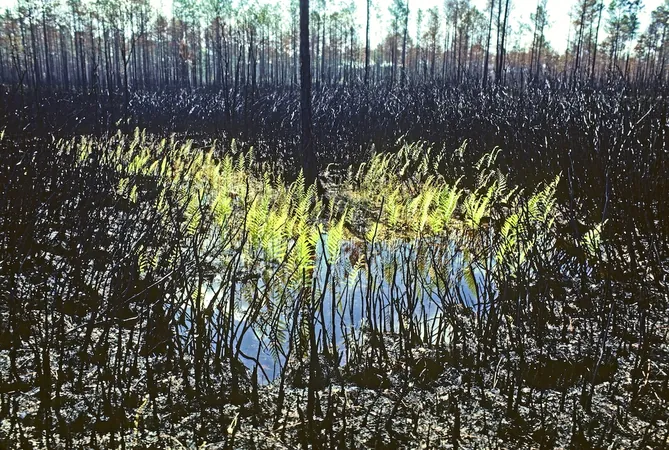
The Incredible Power of Ferns: Nature's Resilient Heroes in Recovery After Disasters
2024-12-21
Author: Mei
Introduction
Scientists have unveiled a groundbreaking discovery about ferns—these ancient plants may play a crucial role in helping ecosystems recover after catastrophic events. Instead of competing with other organisms, it appears that ferns serve as catalysts for rejuvenation, supporting both plant and animal life as they reestablish themselves in devastated landscapes.
New Perspectives on Ferns
A recent study backed by NASA analyzed the recovery of ecosystems following significant disasters like wildfires. By adopting a "facilitative" approach—wherein organisms benefit each other—researchers are challenging the traditional competition-based viewpoint that investigators have long relied upon. The study asserts that this outdated perspective on ferns needs a thorough reexamination due to emerging evidence highlighting the positive interactions between ferns and surrounding species.
Key Research Findings
The research, titled “Ferns as Facilitators of Community Recovery Following Biotic Upheaval,” was published in the journal *BioScience*. It combines fossil records and modern ecological data, illustrating how ferns can act as facilitators of recovery by stabilizing soils, enhancing soil properties, and mediating competition among species.
The Ancient Resilience of Ferns
Ferns, which have existed for approximately 360 million years, were once the predominant plants on Earth until flowering species took the lead. They reproduce through spores rather than seeds, and their abundant spore production allows them to recolonize areas post-disaster rapidly. Interestingly, ferns are often among the first plants to return after upheavals, a trait that has long been attributed to their competitive advantage. However, this study demonstrates that their success is not merely competitive; it involves a complex web of facilitative interactions.
Historical Context and Ecological Impact
When I ponder ecosystems over geological time, I envision myself standing in one location for a million years, imagining what would fossilize," explains Lauren Azevedo Schmidt, the study's lead author from UC Davis. This unique perspective shapes her research, aiming to create synergy between modern ecology and paleobotany.
Implications for Future Research
The implications of this study extend beyond just ecological recovery; it could transform our understanding of community resilience in disturbed habitats. Given their global distribution, ferns' ability to promote positive interactions could be pivotal in managing ecosystems facing climate change and habitat degradation.
Survival Through Extinction Events
Moreover, ferns survived some of Earth's most monumental extinction events, including the Cretaceous-Paleogene (K-Pg) extinction, which obliterated around 75% of species over 66 million years ago. This resilient lineage offers insights into the evolutionary impacts of mass extinctions and extreme environmental changes, providing valuable context for today’s ecological challenges.
Extraterrestrial Exploration and Sustainability
The resilience of ferns also holds immense potential for extraterrestrial exploration. As part of NASA's Space Biology program, researchers are investigating how plants can adapt to space conditions, drawing knowledge from resilient species like ferns. This could pave the way for cultivating crops to provide fresh food during long-duration space missions to Mars or beyond—ensuring sustainable life support for future explorers.
Conclusion
Previous research has suggested that plants can filter air and improve environments in closed spaces, such as aboard the International Space Station. With their proven ability to transform ecosystems following cataclysmic events, ferns might hold the key to sustaining life not just on Earth but also in outer space. As Azevedo Schmidt states, "Ferns completely reshaped Earth’s biosphere after the K-Pg extinction event, thriving through environmental catastrophes that included extreme climate shifts and continental fires. We all have much to learn from these extraordinary plants." In a world facing increasing environmental challenges, the incredible resilience of ferns underscores the importance of nurturing and understanding these ancient plants. Their unique role in ecological recovery reminds us that even the smallest organisms can have a profound impact on the planet's health and its future.



 Brasil (PT)
Brasil (PT)
 Canada (EN)
Canada (EN)
 Chile (ES)
Chile (ES)
 España (ES)
España (ES)
 France (FR)
France (FR)
 Hong Kong (EN)
Hong Kong (EN)
 Italia (IT)
Italia (IT)
 日本 (JA)
日本 (JA)
 Magyarország (HU)
Magyarország (HU)
 Norge (NO)
Norge (NO)
 Polska (PL)
Polska (PL)
 Schweiz (DE)
Schweiz (DE)
 Singapore (EN)
Singapore (EN)
 Sverige (SV)
Sverige (SV)
 Suomi (FI)
Suomi (FI)
 Türkiye (TR)
Türkiye (TR)